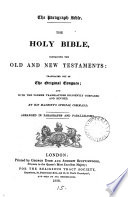 | W. S. Matthews, Thomas Rawson Taylor - 1836 - 406 pages
...comforter ; and on the side of their oppressors there was power, but they had no comforter. Wherefore I praised the dead which are already dead, more than the living which are yet alive."— ECCIES. iv. 1, 2. THERE was a happy uegro home — a happier could not be, The bright abode of health... | |
 | Reginald Heber (bp. of Calcutta.) - 1837 - 396 pages
...was power ; but they had no comforter" — when he beheld these things — " I praised," saith he, " the dead which are already dead, more than the living...hath not yet been, who hath not seen the evil work, which is done under the sun." ' It is true, that, by Christians, to whose eyes the veil of Providence... | |
 | 1837 - 680 pages
...2 Wherefore I praised the dead which are nl ready dead more than the living which are yet alive. 3 afar off, and Moses drewnear unto the thick darkness...where God wo*. 22 And the LORD said unto Moses, T tinder the eun. 4 If Again, I -considered all travail, and every right work, that for this a man is... | |
 | John Dayman - 1837 - 182 pages
...comforter ; and on the side of their oppressors there was power ; but they had no comforter. 2. Wherefore I praised the dead which are already dead more than the living which are yet alive. 3. Yea, better is he than both they which hath not yet been, who hath not seen the evil work that is... | |
 | William SHEPHERD (of Ilfracombe.) - 1837 - 132 pages
...the sun is grievous unto me : for all is vanity and vexation of spirit," Eccl. ii. 17. " Wherefore I praised the dead which are already dead more than the living which are yet alive," Eccl. iv. 2. His ideas of the Almighty now alarmed him; his life was a burden, and nothing but the... | |
 | 1838 - 1196 pages
...praised the dead which are already dead more 3 than the living which are yet alive. Yea, botter w lie the L «un. 4 Again, I considered all travail, and 5 every right work, that for this a man is 5 envied of... | |
 | 1838 - 606 pages
...who are already dead more than the living who are yet alive, adding, "better is he than both they who hath not yet been, who hath not seen the evil work that is done under the sun." Assuredly, it was not with an expectation that it would be the abode of holy and happy generations... | |
 | 1839 - 1060 pages
...the f side of their oppressors there was power ; but they had no comforter. b Job a. 17, 2 "Wherefore 0 ]. c** s. 11, Q c yea, better is he than both they, which hath not yet been, who hath not seen the evil... | |
 | Joseph Stevens Buckminster - 1839 - 472 pages
...may escape by an early removal from this region of uncertainty. The Preacher once said, " Wherefore I praised the dead, which are already dead, more than the living, which are yet alive." It may be so now. Our departed brother is, at least, delivered from an emaciating and distressing complaint;... | |
 | John Scott - 1839 - 554 pages
...afflict the just. The afflictions of some are so great as to induce the spectator to s,ay, " Wherefore I praised the dead, which are already dead, more than the living which are alive." The grave often appears a desirable refuge from the calamities of life, and excites to implore... | |
| |